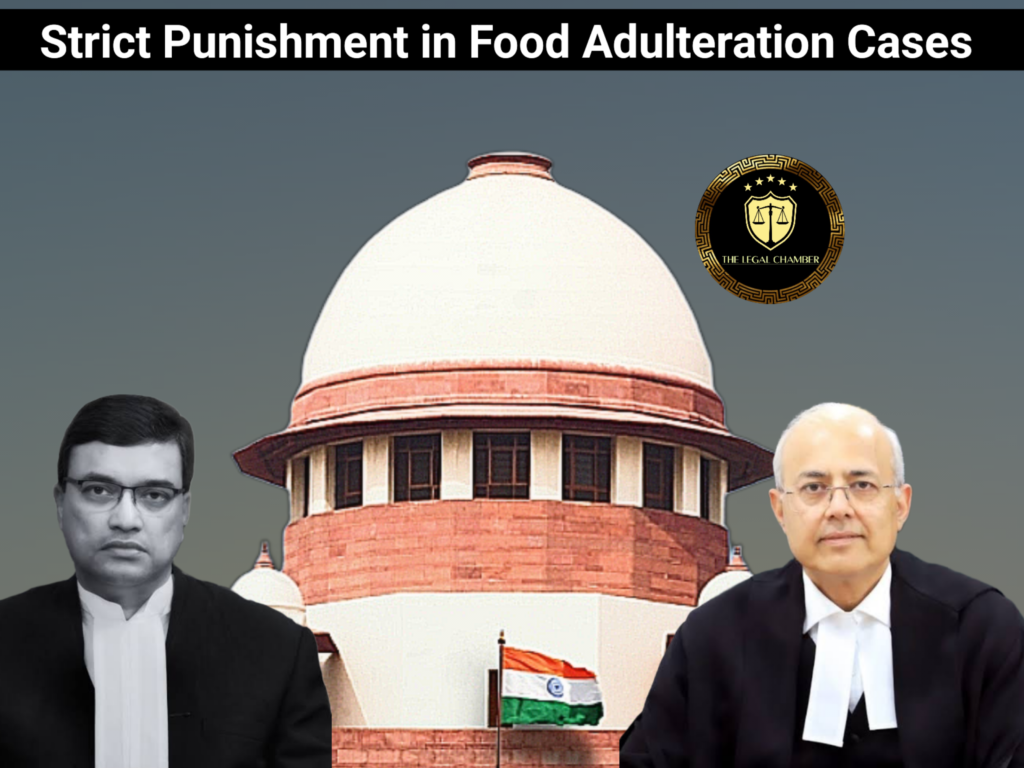
The Supreme Court ruled that Section 20AA of the Prevention of Food Adulteration Act (PoFA), 1954, bars probation for offenders convicted under the Act between 1976 and 2006, upholding strict sentencing to deter food adulteration. It also held that the Food Safety and Standards Act (FSSA), 2006’s repeal clause preserves penalties under PoFA, denying retrospective benefit of reduced sentences. However, citing discrepancies in evidence, the Court partially allowed the appeals by converting imprisonment into fines, balancing strict legal interpretation with equitable relief. The judgment reaffirms legislative intent to prioritize public health over reformative leniency in food safety violations.
Facts Of The Case:
The case involved two criminal appeals before the Supreme Court of India, arising from separate incidents under the Prevention of Food Adulteration Act (PoFA), 1954. In the first appeal, Nagarajan & Selvaraj were convicted for selling adulterated curd in 2001, as lab tests showed fat content below the prescribed standard for buffalo milk. However, a conflicting Central Food Laboratory report later indicated compliance, creating doubt. The Trial Court sentenced them to six months’ imprisonment and a fine, which was upheld by appellate courts.
In the second appeal, Naresh Chandra was convicted in 1985 for obstructing a Food Inspector from collecting samples of spices and other food items in Uttar Pradesh. He refused to sign the inspection form and intimidated officials, leading to his conviction under PoFA with a similar six-month jail term and fine, confirmed in appeal.
Both sets of appellants argued for probation under the Probation of Offenders Act, 1958, or reduced sentences under the milder Food Safety and Standards Act (FSSA), 2006, which replaced PoFA. The Supreme Court rejected probation, citing Section 20AA of PoFA (which excluded probation for food adulteration offenses), and declined to apply FSSA’s lenient penalties retrospectively. However, considering evidentiary discrepancies in Nagarajan’s case and prolonged litigation in Naresh’s case, it converted their jail terms into fines. The judgment balanced strict enforcement of food safety laws with discretionary relief.
Procedural History:
The procedural history of the case traces the legal journey of two separate appeals merged by the Supreme Court. In Nagarajan & Selvaraj’s case, the Trial Court (2006) convicted them under the Prevention of Food Adulteration Act (PoFA), imposing six months’ imprisonment and a fine. The Appellate Court (2009) upheld the conviction, as did the Madras High Court (2019) in revision. Similarly, in Naresh Chandra’s case, the Trial Court (1987) convicted him for obstructing a food inspector, a decision affirmed by the Appellate Court (1988) and the Allahabad High Court (2019) in revision. Both sets of appellants filed Special Leave Petitions (SLPs) before the Supreme Court, which issued notices limited to the question of sentencing. The Supreme Court consolidated the appeals, examining whether probation or reduced sentences under the repealed PoFA or successor Food Safety and Standards Act (FSSA) could apply. Ultimately, it upheld the convictions but partially allowed the appeals by converting imprisonment into fines, citing judicial discretion and mitigating circumstances. The judgment reaffirmed strict penalties under PoFA while granting equitable relief in execution.
READ ALSO : "Supreme Court Clarifies Key Tax Exemption Case" Customs Duty Exemption Upheld for Soybean Oil Imports
Court Observation:
The Supreme Court made several key observations while adjudicating the appeals. It emphatically upheld the exclusion of probation under Section 20AA of the PoFA Act, ruling that the legislative intent was clear—food adulteration offenses between 1976 and 2006 were to be treated strictly, without the leniency of the Probation of Offenders Act. The Court noted that public health and consumer safety took precedence over reformative justice in such cases.
On the question of applying the FSS Act’s milder penalties retrospectively, the Court held that the savings clause (Section 97) explicitly preserved punishments under the repealed PoFA Act, barring any automatic benefit from the newer law. It distinguished this case from precedents like T. Barai, emphasizing that specific repeal provisions override general beneficial interpretations.
However, the Court exercised judicial discretion in partially relieving the appellants. In Nagarajan’s case, it highlighted discrepancies in lab reports (4.6% vs. 8.3% fat content) as creating reasonable doubt, warranting conversion of imprisonment to a fine. For Naresh Chandra, it reluctantly followed the coordinate bench’s precedent in A.K. Sarkar & Co., converting his sentence to a fine despite reservations, citing prolonged litigation and fairness. The judgment thus balanced strict statutory adherence with equitable relief.
Final Decision & Judgement:
In its final judgment, the Supreme Court partially allowed both appeals while upholding the strict legal framework governing food adulteration offenses. The Court rejected the appellants’ plea for probation, affirming that Section 20AA of the PoFA Act categorically barred the application of the Probation of Offenders Act to offenses committed between 1976 and 2006. It also denied retrospective application of the milder penalties under the FSS Act, ruling that the savings clause (Section 97) preserved the original punishments under the repealed PoFA Act. However, exercising judicial discretion, the Court converted the six-month imprisonment sentences into fines—Rs. 30,000 each for Nagarajan and Selvaraj (due to discrepancies in lab reports) and Rs. 20,000 for Naresh Chandra (in line with precedent despite reservations). The appellants were given until June 2025 to pay the fines, failing which the original prison terms would be reinstated. The judgment underscored the primacy of public health in food safety laws while acknowledging mitigating circumstances to ensure equitable justice.
Case Details:
Case Title: Nagarajan & Anr. vs. The State of Tamil Nadu & Naresh Chandra @ Naresh Babu vs. State of Uttar Pradesh Citation: 2025 INSC 703 Criminal Appeal No: Criminal Appeal No. 1390 of 2025 & Connnected Matters Date of Judgment: May 15, 2025 Judges/Justice Name: Justice Dipankar Datta & Justice Manmohan
Download The Judgement Here